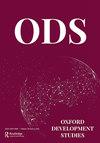孩子们在环境杂务方面的工作:谁说
IF 1.2
Q3 DEVELOPMENT STUDIES
引用次数: 0
摘要
摘要收集发展中国家儿童社会人口统计数据的标准方法是从成年人那里获取信息。虽然使用代理受访者适合年幼的儿童或可能超出儿童知识范围的问题,但不太清楚这是否对年龄较大的儿童和他们经验范围内的话题更好。有几种观点认为,与代理受访者相比,儿童可以提供更好或同样有效的活动信息。我们在坦桑尼亚农村儿童从事环境家务的背景下探讨了这个问题,使用的数据包括对10-17岁儿童的平行问题,以及对这些儿童的代理受访者。鉴于对这一问题的研究很少,我们提供的探索性证据表明,直接从儿童那里收集数据的努力是富有成效的,应该根据《联合国儿童权利公约》第12条大力开展本文章由计算机程序翻译,如有差异,请以英文原文为准。
Children’s work in environmental chores: ‘says who?’
ABSTRACT The standard approach for collecting sociodemographic data about children in developing countries is to elicit information from adults. While using proxy respondents is appropriate for very young children or for questions likely beyond children’s knowledge, it is less clear that it is better for older children and topics within their experience. Several arguments can be made that children could provide better or equally valid information on their activities than proxy respondents. We explore this question in the context of children’s work on environmental chores in rural Tanzania, using data that include parallel questions to children ages 10–17 and to proxy respondents about those children. Given the paucity of research on this issue, we offer exploratory evidence suggesting that efforts to collect data directly from children are fruitful and should be vigorously pursued, in keeping with Article 12 of the United Nations Convention on the Rights of the Child
求助全文
通过发布文献求助,成功后即可免费获取论文全文。
去求助
来源期刊

Oxford Development Studies
DEVELOPMENT STUDIES-
CiteScore
2.70
自引率
0.00%
发文量
20
期刊介绍:
Oxford Development Studies is a multidisciplinary academic journal aimed at the student, research and policy-making community, which provides a forum for rigorous and critical analysis of conventional theories and policy issues in all aspects of development, and aims to contribute to new approaches. It covers a number of disciplines related to development, including economics, history, politics, anthropology and sociology, and will publish quantitative papers as well as surveys of literature.
 求助内容:
求助内容: 应助结果提醒方式:
应助结果提醒方式:


